Study guides, Class notes & Summaries
Looking for the best study guides, study notes and summaries about ? On this page you'll find 153 study documents about .
Page 4 out of 153 results
Sort by
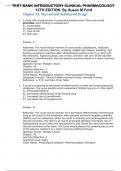
-
Chapter 42, Thyroid and Antithyroid Drugs TEST BANK INTRODUCTORY CLINICAL PHARMACOLOGY 12TH EDITION By Susan M Ford
- Exam (elaborations) • 13 pages • 2024
- Available in package deal
-
- $3.50
- + learn more
1. A client with thyrotoxicosis is prescribed levothyroxine. The nurse would prioritize which finding on assessment? A) Tachycardia B) Agranulocytosis C) Loss of hair D) Skin rash Answer: A Rationale: The nurse should monitor for tachycardia, palpitations, headache, nervousness, insomnia, diarrhea, vomiting, weight loss, fatigue, sweating, and flushing as adverse reactions after administering levothyroxine to a client with thyrotoxicosis. Agranulocytosis, loss of hair, and skin rash ar...
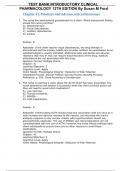
-
Chapter 41, Pituitary and Adrenocortical Hormones TEST BANK INTRODUCTORY CLINICAL PHARMACOLOGY 12TH EDITION By Susan M Ford
- Exam (elaborations) • 16 pages • 2024
- Available in package deal
-
- $3.49
- + learn more
1. The nurse has administered gonadotropin to a client. Which assessment finding should the nurse prioritize? A) Abdominal pain B) Visual disturbances C) Auditory disturbances D) Ascites Answer: B Rationale: If the client reports visual disturbances, the drug therapy is discontinued and the primary health care provider notified. An examination by an ophthalmologist is usually indicated. Abdominal pain and ascites are adverse reactions that may or may not require discontinuation of the ...
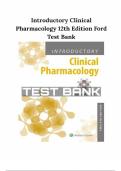
-
Test Bank For Introductory Clinical Pharmacology 12th Edition By Susan Ford 9781975163730 Chapter 1-54 | Complete Guide A+
- Exam (elaborations) • 607 pages • 2024
-
- $19.99
- + learn more
Introductory Clinical Pharmacology 12th Edition Ford Test Bank. This is a bank of tests (study questions) to help you prepare for the tests. To clarify, this is a test bank, not a textbook. You have immediate access to download your test bank. No delays, loading is fast and instant immediately after ordering! You will receive a full bank of tests; in other words, all chapters will be there. Test banks are presented in PDF format; therefore, no special software is required to open them.
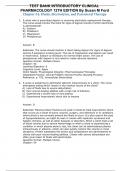
-
Chapter 54, Fluids, Electrolytes, and Parenteral Therapy|| TEST BANK INTRODUCTORY CLINICAL PHARMACOLOGY 12TH EDITION By Susan M Ford
- Exam (elaborations) • 12 pages • 2024
- Available in package deal
-
- $3.48
- + learn more
1. A client who is prescribed digoxin is receiving electrolyte replacement therapy. The nurse would monitor the client for signs of digoxin toxicity if which electrolyte is administered? A) Sodium B) Potassium C) Magnesium D) Phosphorous Answer: B Rationale: The nurse should monitor a client taking digoxin for signs of digoxin toxicity if potassium is being given. The use of magnesium and digoxin can result in heart block. Sodium is necessary for normal heart action. The use of phosph...
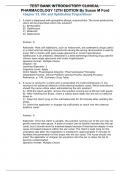
-
Chapter 53, Otic and Ophthalmic Preparations|| TEST BANK INTRODUCTORY CLINICAL PHARMACOLOGY 12TH EDITION By Susan M Ford
- Exam (elaborations) • 14 pages • 2024
- Available in package deal
-
- $3.66
- + learn more
1. A client is diagnosed with springtime allergic conjunctivitis. The nurse predicts the client will be prescribed which otic solution? A) Brimonidine B) Gatifloxacin C) Betaxolol D) Nedocromil Answer: D Rationale: Mast cell stabilizers, such as nedocromil, are ophthalmic drugs useful in a client who has allergic conjunctivitis during the spring. Brimonidine is used to lower IOP in clients with open-angle glaucoma or ocular hypertension. Gatifloxacin is an antibiotic. Betaxolol is a be...
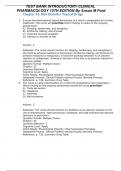
-
Chapter 52, Skin Disorder Topical Drugs|| TEST BANK INTRODUCTORY CLINICAL PHARMACOLOGY 12TH EDITION By Susan M Ford
- Exam (elaborations) • 15 pages • 2024
- Available in package deal
-
- $3.64
- + learn more
1. A nurse has administered topical benzocaine to a client in preparation for a minor treatment. The nurse will prioritize which findings if noted on the ongoing assessment? A) Stinging, tenderness, and sloughing B) Erythema, flaking, and dryness C) Transient burning sensation D) Oiliness or dryness of hair Answer: A Rationale: The nurse should monitor for stinging, tenderness, and sloughing in the client as adverse reactions to benzocaine. Erythema, flaking, and dryness are adverse re...
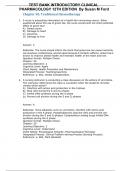
-
Chapter 50, Traditional Chemotherapy|| TEST BANK INTRODUCTORY CLINICAL PHARMACOLOGY 12TH EDITION By Susan M Ford
- Exam (elaborations) • 14 pages • 2024
- Available in package deal
-
- $3.61
- + learn more
1. A nurse is presenting information at a health fair concerning cancer. When questioned about the use of green tea, the nurse would point out which potential effect of green tea? A) Dental caries B) Damage to heart C) Insomnia D) Damage to liver Answer: C Rationale: The nurse should inform the client that green tea can cause insomnia, nervousness, restlessness, and GI upset because it contains caffeine. Green tea is known to improve dental health and maintain health of the heart and l...
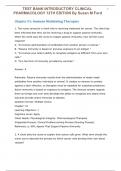
-
Chapter 51: Immune Modulating Therapies ||TEST BANK INTRODUCTORY CLINICAL PHARMACOLOGY 12TH EDITION By Susan M Ford
- Exam (elaborations) • 15 pages • 2024
- Available in package deal
-
- $3.64
- + learn more
1. The nurse caring for a client who is receiving treatment for cancer. The client has been informed that they will be receiving a drug to support passive immunity. When the client asks the nurse to explain passive immunity, how will the nurse respond? A. “It involves administration of antibodies from another person or animal.” B. “Passive immunity is based on previous exposure to an antigen.” C. “It involves your body’s ability to recognize antigens as different from your own ...
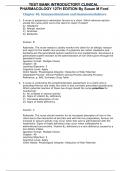
-
Chapter 48, Immunostimulants and Immunomodulators|| TEST BANK INTRODUCTORY CLINICAL PHARMACOLOGY 12TH EDITION By Susan M Ford
- Exam (elaborations) • 14 pages • 2024
- Available in package deal
-
- $3.63
- + learn more
1. A nurse is preparing to administer ferrous to a client. Which adverse reaction should the nurse point out to the client to report if noted? A) Headache B) Allergic reaction C) Soreness D) Backache Answer: B Rationale: The nurse needs to closely monitor the client for an allergic reaction and report to the health care provider if symptoms are noted. Headache and backache are the generalized system reactions to iron supplements. Soreness is a generalized system reaction to the adminis...
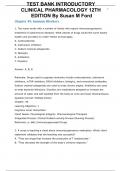
-
Chapter 49: Immune Blockers|| TEST BANK INTRODUCTORY CLINICAL PHARMACOLOGY 12TH EDITION By Susan M Ford
- Exam (elaborations) • 17 pages • 2024
- Available in package deal
-
- $3.66
- + learn more
1. The nurse works with a number of clients who require immunosuppressive treatment of autoimmune diseases. What classes of drugs would the nurse expect health care providers to order? Select all that apply. A. Corticosteroids B. Calcineurin inhibitors C. Sodium channel antagonists D. Biologics E. Antibiotics F. Diuretics Answer: A, B, D Rationale: Drugs used to suppress immunity include corticosteroids, calcineurin inhibitors, mTOR inhibitors, IMDH inhibitors, biologics, and monoclon...

Study stress? For sellers on Stuvia, these are actually golden times. KA-CHING! Earn from your study resources too and start uploading now. Discover all about earning on Stuvia


